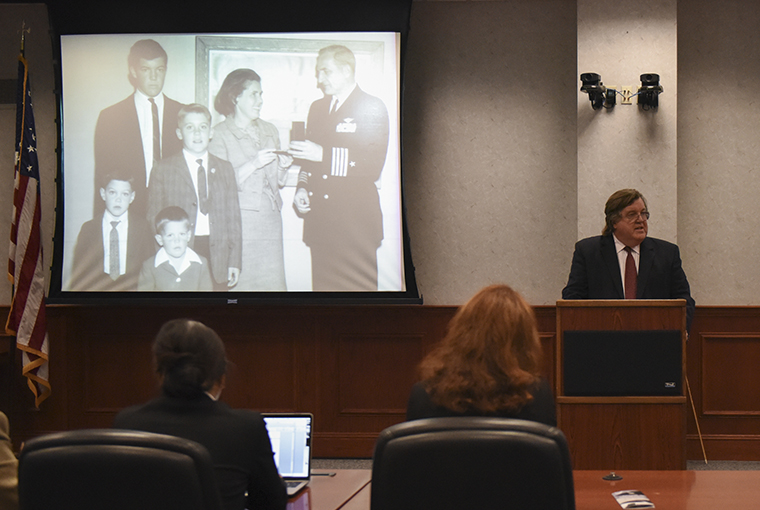James Stockdale’s son talks about father’s legacy, in advance of new book collecting Navy hero’s papers

NEWPORT, R.I. -- When people at the U.S. Naval War College talk about ethics, they talk about James Stockdale, who led American prisoner-of-war resistance at the “Hanoi Hilton” during the Vietnam War.
Stockdale famously cut his own wrists to show his captors that he preferred death over submission, a move credited with hastening the end of Vietnamese torture of POWs.
In advance of a new compilation of the late vice admiral’s papers, his eldest son spoke at the Navy college this week.
James B. Stockdale II was asked what his father, who died in 2005, would think about his life story still forming the backbone of ethics training at the institution he once served as president.
“Nothing would bring him more heartfelt joy,” Stockdale, 67, told an audience of military students Wednesday.
Stockdale talked to students about the behind-the-scenes personal impact of his father’s seven-year imprisonment in Hoa Lo prison, which the family euphemistically referred to as “the long cruise.”
Following the fateful September 1965 knock at the door, the Coronado, Calif.-based Stockdale family reeled from the information that the 40-year-old aviator went missing after his A-4 Skyhawk was downed by anti-aircraft fire.
Sybil Stockdale went on to found the National League of POW/MIA Families, a nonprofit that advocated on behalf of families of Vietnam-era missing-in-action and imprisoned troops. She also eventually worked with the CIA to use her correspondence with her husband to send coded messages to American prisoners in Vietnam.
But the emotional impact on Sybil Stockdale and her four sons was profound, James Stockdale said.
At first, his mother decided to buy no new clothes until her husband came home. Once, to keep their father in their thoughts at dinnertime, the boys were each served a little bowl of rice.
The grief surrounding his father’s missing years, Stockdale said, is a weight that will always follow him.
Stockdale, a retired educator living in Pennsylvania, said he thinks the nation may be more receptive to lessons from the Vietnam experience now with the distance of decades.
“The divisiveness of the war made us put that in a drawer marked ‘too hard.’ But now we can open it up a little bit and it doesn’t seem threatening,” Stockdale said after his talk. “Here is a portion of our history that we should examine so we can learn and grow.”
The Stockdale archive at the college’s John B. Hattendorf Center for Maritime Historical Research consists of hundreds of the late admiral’s papers, including original correspondence, speeches and articles. Much of the material remains unpublished.
War College faculty are working on a book that assembles some of this material, with an eye toward ensuring that the Stockdale legacy on ethics and leadership continues with the next generation.
Publication is expected next year from the Naval War College Press. The faculty involved are Tom Gibbons of the associate provost’s office and Tim Demy and Gina Palmer, both in the College of Leadership and Ethics.
Gibbons co-teaches the Foundations of Moral Obligation ethics class -- often referred to as “the Stockdale course.”
The more than 40-year-old class was created by Stockdale during his tenure as president of the college between 1977 and 1979. It remains one of the most popular electives among students.
“The Stockdale name is synonymous with leadership and ethics,” Gibbons said. “We wanted to bring Stockdale’s work out in the light of day and share it with others throughout the U.S. Navy so that his legacy will continue.”
After torture and multiple injuries, Stockdale was released in 1973 and returned home to a hero’s welcome from his family and the nation. He was awarded the Medal of Honor in 1976.
Asked by a student how Stockdale managed to avoid cynicism after everything he experienced, James Stockdale II answered that his father felt he had done his duty.
“He knew all too well the vagaries of the world and politics,” the younger Stockdale said. “He regained his composure and went on.”
